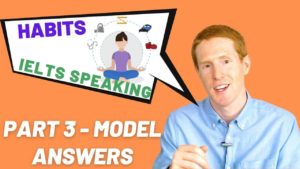IELTS Vocabulary Course
-
Course Outline and Content
-
How to Increase your Vocabulary
-
People and Community
Describing People -
Upbringing and Family
-
Health and Happiness
-
Roles and Responsibility
-
Crime
-
Revision: People and Community
-
Geography and The EnvironmentBuildings and Cities
-
The Environment
-
Travel
-
Nature and Wildlife
-
Assessing Efforts
-
Revision: Geography and The Environment
-
Education, Technology and SkillsSkills and learning
-
Education
-
Work
-
Economy
-
Technology
-
Revision: Education, Technology and Skills
-
End of the CourseEnd of the Vocabulary Course, what's next...
Describing People
- 1 hour
Slow video loading? View the Alternative Video Source
Word list (20 words)
The kind/type of (person) who… (informal phrase) /ðə.kaɪndə.pəsən.hu/ /ðə.taipə.pəsən.hu/
A phrase for describing typical behaviour of someone.
He’s the kind of person who goes to bed at the same time every night.
Composed (adjective) /kəmˈpəʊzd/
Calm and in control of your emotions.
It’s important to stay composed if you get asked a tricky question during the IELTS speaking exam.
- Collocation: calm and composed
Compose (verb): When you feel stressed, take a deep breath and try to compose yourself.
Composure (noun: uncountable): You might feel nervous, but don’t lose your composure in the speaking exam.
Materialistic (adjective) /məˌtɪərɪəˈlɪstɪk/
Believing that having money and possessions is the most important thing in life.
- Materialistic + noun: materialistic + society/person/ generation
Older generations feel that the youth are too materialistic: always shopping for new clothes or the latest smartphone.
Materialism (noun): She writes about the greed and materialism of modern society.
Rapport (noun: uncountable) /rep’or/
A good understanding of someone and an ability to communicate well with them.
It’s important for teachers to develop a good rapport with their students.
- Verb + rapport: build/ establish + rapport
- Adjective + rapport: friendly/ good/ close + rapport
Diligent (adjective) /ˈdɪlɪdʒ(ə)nt/
Careful and using a lot of effort.
Diligent students tend to do better in exams than those that try and cram last minute.
- diligent + student
Diligence (noun: uncountable): They carry out their work with diligence and care.
Diligently (adverb): The students diligently completed all the tasks they were given.
Status symbol (noun: countable) /ˈsteɪ.təsɪmbəl/ or /ˈstætəsɪmbəl/
Something that people want or have because they think other people will respect them for it.
Cars act as a status symbol for many people.
act as a/ represent + status symbol
Inquisitive (adjective) /ɪnˈkwɪzɪtɪv/
Wanting to discover as much as you can about things (sometimes in a way that annoys people).
Children should be encouraged to be inquisitive and ask lots of questions in school.
- inquisitive + about (something)
- Inquisitive + noun: inquisitive + child/ student/ mind
Temperament (noun: uncountable) /ˈtɛmp(ə)rəm(ə)nt/
The part of your character that affects your moods and the way you behave.
My best friend has always had a calm temperament. Even when he’s in a stressful situation.
- Adjective + temperament: good/ calm/ fiery/ angry/ moody + temperament
Temperamental (adjective): liable to unreasonable changes in behaviour and mood: He is very temperamental: one moment he’s in a good mood and a second later he’s angry.
Have (something) in common with (someone) (idiom) /hæv.sʌmθɪŋ.ɪnkɒmən.wɪð/
To share the same interests or have similar characteristics.
I feel that I have nothing in common with any of my work colleagues.
Studious (adjective) /ˈstjuːdɪəs/
Someone that likes or spends a long time studying.
Teachers tend to like children that are intelligent and studious.
- Studious + noun: studious + (person) child/ student/ boy/ girl
Studiously (adverb): He gets on with his work quietly and studiously.
People person (adjective) /‘pi:p(ə)l.pərs(ə)n/
Someone who is friendly and enjoys meeting and talking to people.
I’ve never been much of a people person; I prefer to stay at home with a good book.
Demanding (adjective) /dɪˈmɑːndɪŋ/
Making others work hard or meet high standards; not easily satisfied.
I have a particularly demanding job. I work long hours and meet strict deadlines.
demanding + job/ boss/ course/ child/ parents
Role model (noun: countable) /ˈrəʊlmɒd(ə)l/
A person who someone admires and whose behaviour they try to copy.
Sports stars are role models for thousands of young people.
- Adjective + role model: good/ bad/ excellent + role model
Get on (with) (phrasal verbs) /ge(t)ɒnwɪð/
If two people get on, they like each other and are friendly to each other.
Life can be very difficult if you don’t get on with the people you live with.
You can also use ‘get along’ to mean the same thing.
Ambitious (adjective) /amˈbɪʃəs/
Having a strong wish to be successful, powerful, or rich.
Bosses are more likely to notice and promote ambitious staff.
ambitious + noun: ambitious + people/ teacher/ colleague/ friend
Ambition (noun: uncountable): Her ambition is to run her own business.
Ambitiously (adverb): He set off ambitiously to be the first person to climb to the top of the mountain alone.
Narrow-minded (adjective) /narəʊˈmʌɪndɪd/
(opposite: broad-minded/ open-minded)
Not willing to accept ideas or ways of behaving that are different from your own.
Young, idealistic people often find older generations to be narrow-minded.
Similar: closed-minded
Idealistic (adjective) /ʌɪdɪəˈlɪstɪk/
Believing that very good things can be achieved, often when this does not seem likely to other people.
Young graduates tend to leave university feeling optimistic and idealistic about changing the world.
- idealistic + person/ child/ student
Idealism (noun: uncountable): She never lost her youthful idealism and campaigned for just causes all of her life.
Stereotype (noun/ adjective/ verb) /ˈsteriəʊtaɪp/
A set idea that people have about what someone or something is like.
Adverts on television are full of cultural stereotypes.
- Verb + stereotype: conform/ fit/ fill/ reinforce/ negative + stereotype
Stereotype (verb): We should not give children sexually stereotyped toys.
Stereotypical (adjective): He’s a stereotypical farmer: he wears checkered shirts and spends most of his time outside.
Charismatic (adjective) /karɪzˈmatɪk/
Used to describe people who seem to have a natural ability to influence or attract other people.
Charismatic teachers are more popular with their students.
- Charismatic + noun: charismatic + leader/ figure/ authority
Charisma (noun: uncountable): How did someone with so little charisma get to be president.
Optimism/ pessimism (noun: uncountable) /ˈɒptɪmɪz(ə)m/ /ˈpɛsɪmɪz(ə)m/
Optimism: a belief that something good will happen.
Pessimism: the belief that bad things are more likely to happen than good things.
There is a mood of deepening pessimism about the economy.
- Verb + optimism/pessimism: express/ cause + optimism
Optimistic/pessimistic (adjective): He’s optimistic/ pessimistic about the future.
Extra
Self + confident/ centred/ conscious/ reliant/ aware/ control/ made
- A self-confident person behaves calmly because he/she has no doubts about his/her ability or knowledge.
- A self-centered person is only interested in themselves or their own activities.
- If you are self-conscious then you are worried about what people think about you.
- A self-sufficient person does not need help or support from other people.
- A self-aware person has a very good understanding of themselves.
- If someone has self-control then they have control over their actions or emotions.
- If someone is self-made they have become rich and successful as a result of their handwork (not family money)
Personalise the vocabulary
A proven way to learn vocabulary is to personalise it. Type your answers into this form and print it off as study material. You can also practice these IELTS style questions with a partner. You can only save and print your answers if you do this activity on a computer (not a mobile phone). You will not get tutor feedback on your answers. This activity is simply for you to practice the vocabulary.





